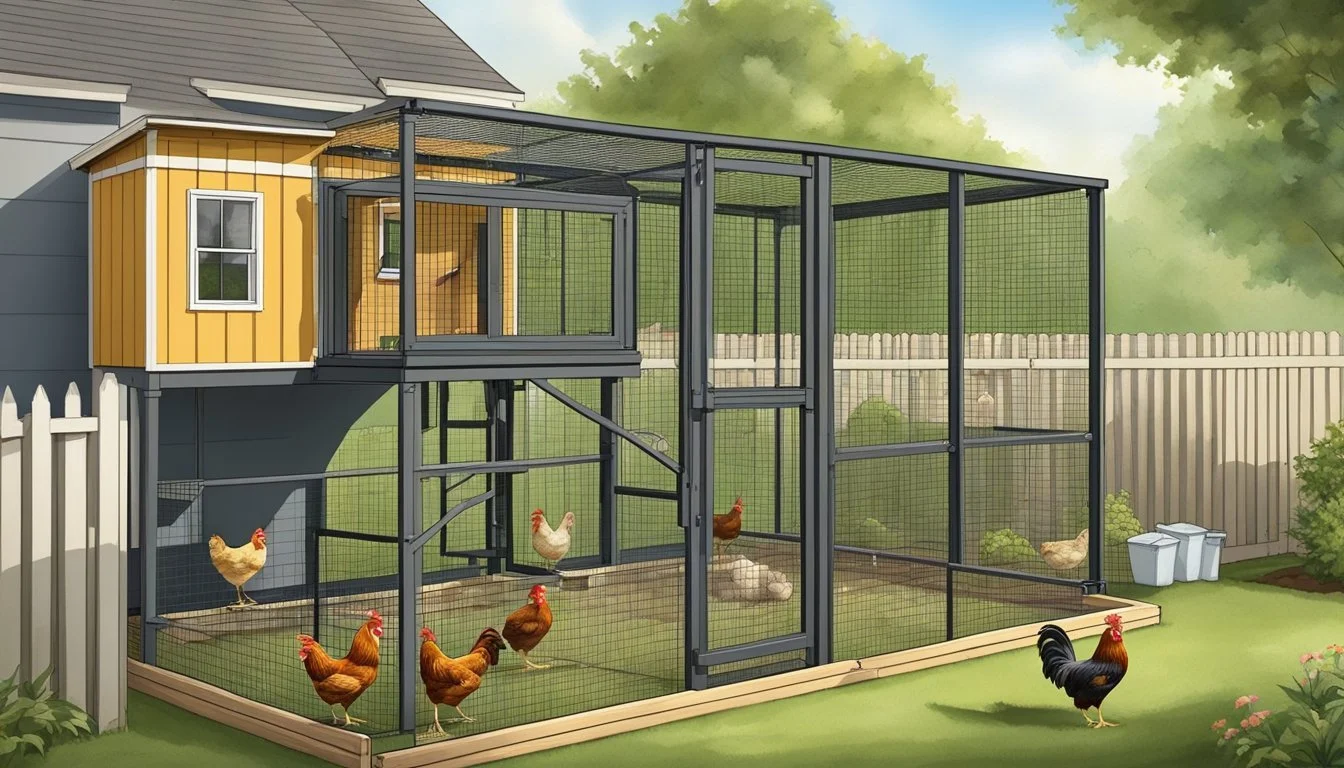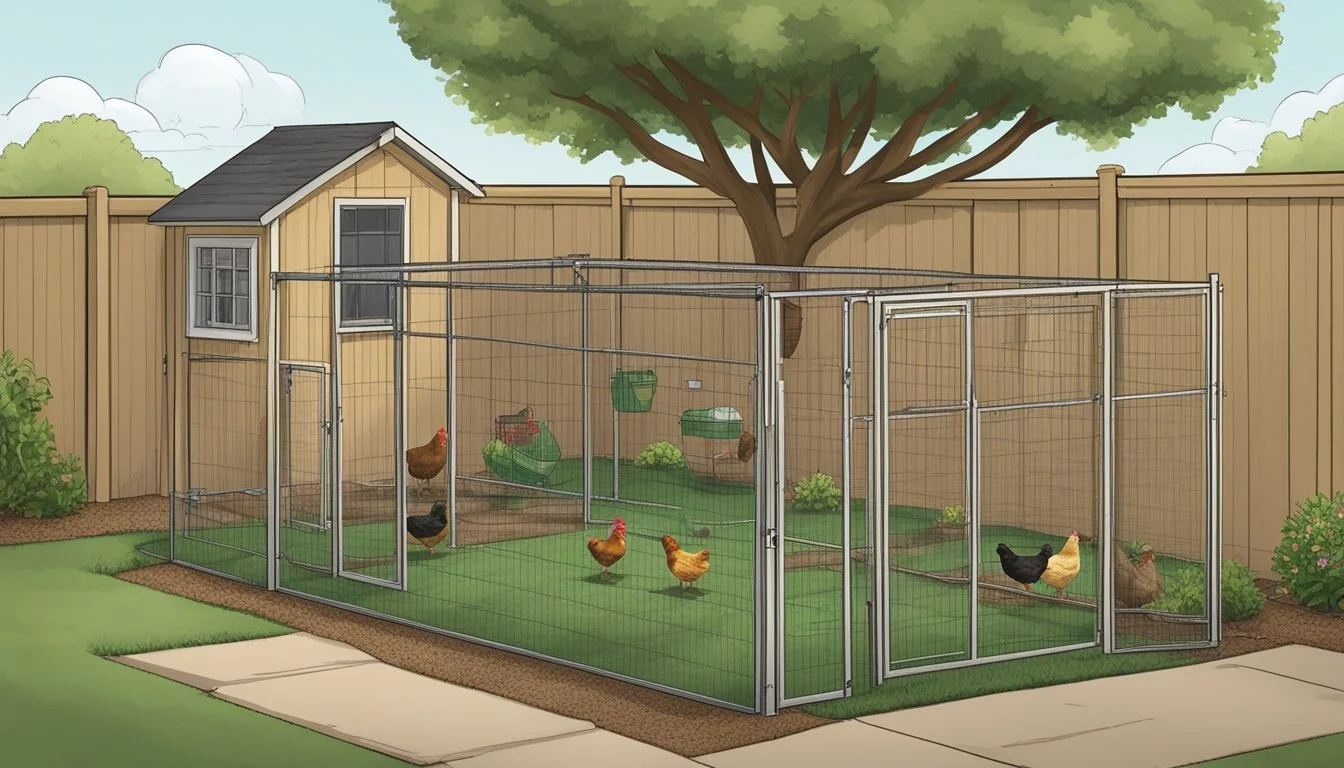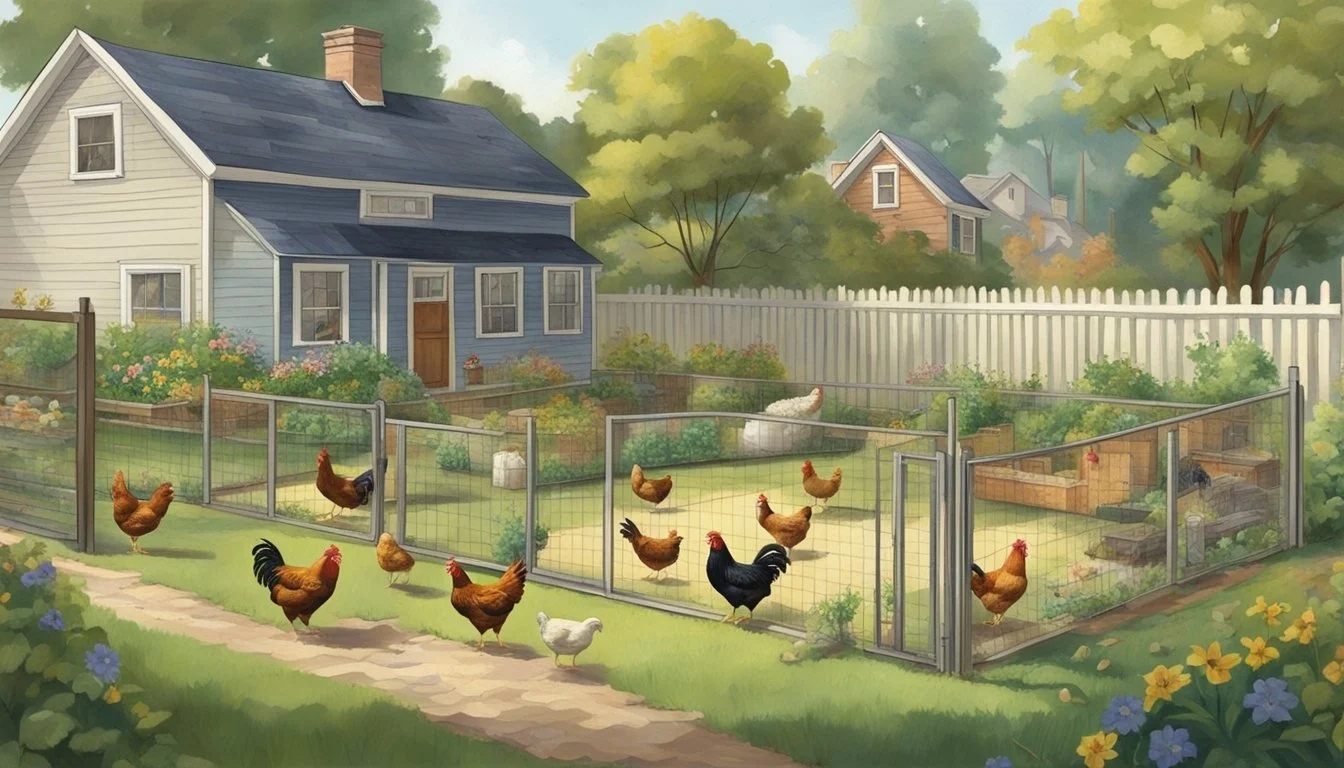Keeping Backyard Chickens in Grand Prairie, TX
Your Essential Guide to Urban Poultry
Keeping backyard chickens has become increasingly popular among residents seeking a more sustainable lifestyle and fresh eggs. In Grand Prairie, Texas, the practice is regulated by city ordinances to maintain public health and animal welfare. Residents of Grand Prairie looking to keep chickens must adhere to specific guidelines to ensure they are within their rights and not causing a nuisance to neighbors.
Grand Prairie's regulations do not require a permit to keep chickens, making it accessible for homeowners to start their own backyard flock. However, there are coop restrictions that stipulate chickens must be contained within a coop or pen. This is to manage the chickens' impact on the surrounding environment and to protect the chickens themselves. Moreover, the city enforces strict rules on the number of roosters one can own, with a current limit that does not exceed one rooster per ten acres, aiming to mitigate noise issues. The raising of roosters for cockfighting or similar activities is strictly prohibited within Grand Prairie, reflective of broader animal welfare laws across the state and country.
Legal Overview of Raising Chickens
When considering the rearing of backyard chickens in Grand Prairie, TX, it is crucial to have a clear understanding of city ordinances and zoning laws. These regulations dictate where and how chickens can be kept, ensuring the activity is in line with local land use norms and is not a nuisance to the community.
Understanding City Ordinances
Grand Prairie city ordinances stipulate that no permit is required to keep chickens. However, chickens must be contained in a coop or pen. The city advocates for responsible chicken keeping to avoid potential nuisances. Residents must adhere to local laws that enforce the containment of chickens to minimize disturbances such as noise or odor.
Zoning and Land Use Regulations
For properties within the corporate limits of Grand Prairie, it is important to note that zoning laws dictate the use of land. Chickens are typically permitted in areas zoned for agricultural use. In residential zones, chickens must be kept 150 feet away from houses and other neighboring structures, a distance challenging to maintain in urban settings.
Distinctions for Residential and Commercial Establishments
Residential properties are governed by city ordinances regarding the density and placement of chicken coops. Residents in Grand Prairie are allowed to keep chickens, provided they follow these rules to avoid being classified as a nuisance. Commercial establishments and businesses, on the other hand, must conform to both city ordinances and additional regulations that pertain to the operation of a business involving livestock within city limits. The raising of chickens for commercial purposes might involve further compliance with health and safety standards.
Basic Requirements for Keeping Chickens
In Grand Prairie, Texas, residents looking to keep backyard chickens have to adhere to specific ordinances. Understanding these regulations helps ensure proper care, health, and safety for the chickens, as well as maintaining public health standards.
Shelter and Enclosure Standards
In Grand Prairie, all chickens must be contained within a coop or pen. This enclosure serves as protection from predators and contains the chickens within a designated area, preventing them from roaming freely.
Key Shelter Standards:
Must be contained within a coop or pen
Coop must provide adequate protection and confinement
Minimum Space and Habitat Conditions
While the city ordinances do not specify a minimum square footage for coops, there is a requirement concerning the proximity to neighboring structures. Chickens must be kept at least 150 feet away from any structures housing people. This distance helps minimize noise and maintains sanitary conditions, reducing potential nuisances and health concerns for neighbors.
Space and Habitat Requirements:
Enclosures must be situated 150 feet away from neighboring residential structures
Health and Welfare
Chicken keepers must prioritize the health and welfare of their poultry. This includes providing clean water, regular feeding, and maintaining clean living conditions to prevent disease. Compliance with these standards is essential not only for the well-being of the chickens but also to maintain public health and safety.
Health and Welfare Considerations:
Regular feeding and access to clean water
Maintaining cleanliness to prevent disease and pests
Observation of any signs of distress or illness
By meeting these basic requirements, Grand Prairie residents can maintain a small flock of backyard chickens while staying within the boundaries of local laws and ensuring the welfare of the animals.
Specific Restrictions and Provisions
The city of Grand Prairie, Texas has specific local ordinances in place for residents keen on keeping backyard chickens. These rules are designed to address community concerns, health, safety, and animal welfare.
Roosters and Noise Control
In Grand Prairie, keeping roosters comes with particular constraints due to the potential for noise. The city's ordinances dictate that:
Roosters are allowed but their number must not exceed a density of one per ten acres.
Cockfighting or similar activities involving roosters are strictly prohibited.
Noise restrictions are enforced to minimize disturbances, ensuring that roosters do not create a nuisance for neighbors.
Limitations on the Number of Animals
The permitted number of chickens in a backyard setting is regulated:
Residents can keep up to 30 chickens on their property.
However, in the case of hens, only 2 are allowed within the city limits of Grand Prairie.
There is a restriction on the presence of more than 12 chickens within closer residential confines.
Proximity to Public Spaces and Institutions
Chickens must be kept a considerate distance away from public spaces and institutions to minimize potential nuisances and health concerns:
Chicken coops must be situated at least 150 feet away from any residential structure not owned by the chicken owner.
Similar distance regulations apply to proximity with schools, churches, grocery stores, restaurants, hospitals, and nursing homes, to reduce any impact on these community spaces.
Considerations for Neighbors and Community
In Grand Prairie, TX, keeping backyard chickens involves more than just tending to the birds; it also requires responsible management with regard to neighbors and the broader community. Here are critical aspects to consider in maintaining harmonious neighborhood relations and ensuring community standards are met.
Managing Odors and Waste
Maintaining cleanliness in chicken coops is crucial to prevent offensive odors and fly breeding. Backyard chicken owners should regularly remove waste and sanitize their coops. Composting chicken waste can be effective, but it must be done properly to avoid attracting pests. An enclosed bin is recommended to inhibit pest access.
Proper disposal methods:
Regular removal of droppings
Compost in a contained bin, turning frequently
Double-bag waste if disposed of in regular trash
Handling Noise and Other Nuisances
Noise can be a significant concern for neighbors. Owners should familiarize themselves with local noise restrictions, which often include no excessive noise from dusk till dawn. Roosters are more prone to create disturbances and may not be permitted. To minimize noise and other nuisances:
Implement predator deterrents to prevent chickens from being startled, which reduces noise.
Soundproofing options for coops can help mitigate sounds.
Position coops away from neighbor’s property lines to reduce noise transmission.
Neighborhood Relations and Communication
Positive relations with neighbors are pivotal when keeping backyard chickens. Owners should engage in open communication to address concerns such as predators, nuisance, and property boundaries.
Communication tips:
Notify neighbors before getting chickens.
Share eggs as a gesture of goodwill.
Discuss any concerns openly and respectfully.
By considering these factors, backyard chicken owners in Grand Prairie can enjoy their hobby without disrupting the neighborhood, ensuring that the community remains welcoming for everyone.
Regulatory Compliance and Penalties
When raising backyard chickens in Grand Prairie, Texas, adhering to local ordinances and being aware of penalties for non-compliance are crucial for responsible ownership.
Acquiring Necessary Permits
In Grand Prairie, no permit is required to keep chickens, provided they are contained within a coop or pen. Owners must ensure that coops meet the city's specific requirements, which are accessible through the Grand Prairie city office.
Understanding Possible Penalties
Violations of local chicken laws can lead to various penalties. An offense may include possessing too many roosters, which is limited to one per ten acres. Ensuring chickens do not cause public nuisances like noise, odor, or flies is also important to avoid fines or other penalties.
Updates and Changes in Local Laws
Local ordinances are subject to change, and it is the responsibility of chicken owners in Grand Prairie to stay informed about the latest regulations. Ordinance updates can be found through official city publications or by contacting the city's municipal offices directly.
Care Guidelines for Backyard Chickens
Proper care for backyard chickens in Grand Prairie, TX, involves a diligent approach to feeding, daily activity, and protection. Adequate nutrition, exercise, and safety are crucial for their health and well-being.
Feeding and Nutrition
Chickens require a balanced diet rich in nutrients. Owners should provide a mix of:
Layer pellets: The staple of a chicken's diet, providing essential nutrients.
Grit: Necessary for digestion, should be available at all times.
Calcium sources: Such as oyster shells, to reinforce eggshell strength.
Clean water: Must be accessible at all times, refreshed daily to prevent diseases.
Adequate food and water stations should cater to the flock size, preventing over-crowding and ensuring that all chickens have access.
Daily Exercise and Freedom of Movement
Chickens benefit from daily exercise to maintain health and vigor. An ideal setup in Grand Prairie includes:
Spacious coop: Allowing chickens to move freely.
Protected run: Providing outside access while keeping them safe.
Consider rotational grazing: A method where chickens access various sections of the yard to prevent overuse of any one area.
It's essential for chickens to exhibit natural behaviors like foraging, which contributes to their overall well-being.
Protection from Predators and Extremes
Protection is of utmost importance for keeping chickens safe from predators and weather extremes. Implement these measures:
Secure housing: Coops should be fortified against common predators like raccoons, hawks, and dogs.
Fencing: A sturdy fence around the run can deter invaders; consider burying it to prevent diggers.
Covered areas: Provide both sun and rain cover to shield chickens from harsh weather.
Regular inspections for vulnerabilities in the coop and fencing can help prevent unwanted incursions.








